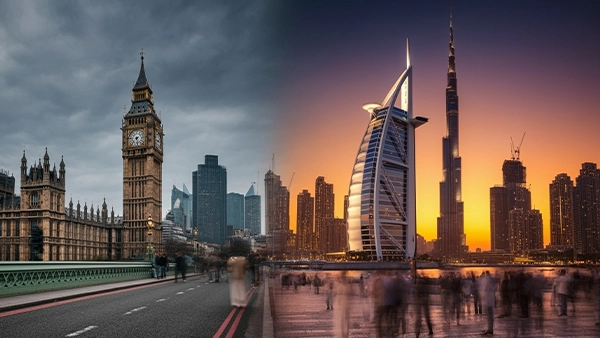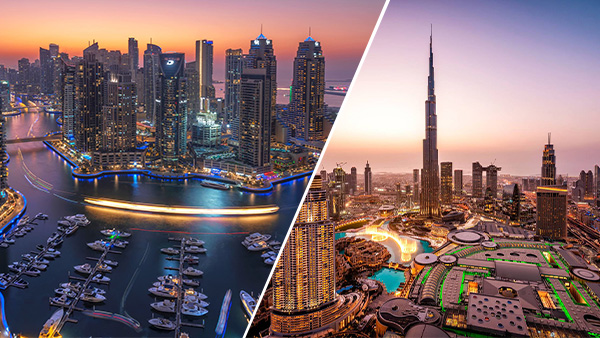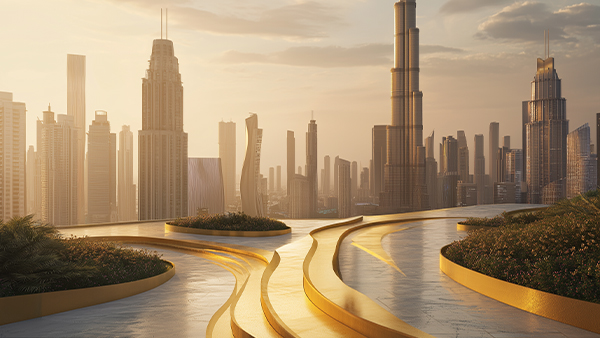Dubai vs. London: Why Investors Are Preferring Dubai
For decades, London has enjoyed a reputation as one of the most stable and prestigious property markets in the world, attracting global capital and offering stability, prestige, and long-term gains.
Investors from across the globe have gravitated toward the UK capital, drawn by its history, global status, and financial influence.
Yet, in recent years, shifting economic conditions, stricter regulations, and rising costs have caused investors to reconsider whether London still offers the returns and accessibility it once did.
And among these, a new player has been steadily rising in prominence.
Underpinned by government reforms, Dubai has transformed into a powerhouse of innovation, luxury, and investor confidence.
What Makes Dubai Special
Attractive yields, lower entry costs, and progressive policies have positioned the city as more than just an alternative; it is becoming the first choice for many global investors.
With both cities commanding international attention, comparing London and Dubai is more relevant than ever.
The following sections explore why the balance of power is shifting and why investors increasingly prefer Dubai when considering long-term growth and lifestyle.
Why Dubai Outshines London
The comparison between London and Dubai highlights two very different outlooks.
London offers history, maturity, and prestige, but comes with high costs, complex regulations, and modest yields.
Dubai, meanwhile, represents growth, accessibility, and innovation.
Here’s a quick breakdown:
Global Connectivity
Positioned strategically, Dubai connects East and West seamlessly. Its world-class airport and logistics infrastructure enhance its appeal to both residents and global businesses.
Dynamic Lifestyle
With over 200 nationalities calling it home, world-class healthcare, and leading amenities, Dubai offers a cosmopolitan lifestyle.
This makes the city a preferred choice for residents and long-term investors.
Tax-Free Environment
Dubai’s tax-free status on property income and capital gains makes it one of the most lucrative destinations globally.
In contrast, London investors face substantial property taxes, income taxes, stamp duties, and up to 28% in capital gains tax.
Affordability with Potential
The average property price per square foot in Dubai is approximately US$576, with some reports stating decent numbers around $438.
In the case of London, different reports cite average per square foot numbers ranging between US$664 and $780, making entry significantly more accessible in the UAE while offering room for strong appreciation.
Danube Properties has been instrumental in driving this affordability, offering flexible payment plans, making property ownership more accessible to both residents and global investors.
High Returns
Rental yields in Dubai average between 6 to 8%, and in popular communities like Business Bay and Dubai Marina, they climb to 10% to 12% for short-term rentals.
London, in contrast, delivers yields around 3-4%, with some prime areas offering even less.
This combination of favorable policies, pricing, and potential makes Dubai more than just an alternative; it is a market that redefines modern investment strategies.
Investment Opportunities in Dubai Real Estate: A Rising Market
Dubai remains one of the world’s fastest-expanding luxury real estate hubs, with property deals in 2024 climbing to 226,000 transactions worth AED 761 billion.
This represented a 36% jump in activity and a 20% increase in value compared to the previous year.
Additionally, off-plan sales dominated in 2024, making up 60% of total transactions, reflecting investor confidence in long-term growth.
In contrast, the UK’s property sector registered a decline in 2023 due to high interest rates. While 2024 was better, the real estate market only witnessed a 6.3% increase in value, falling short when compared to Dubai’s strong momentum.
Hence, when comparing investment opportunities in Dubai with those in London, a clear pattern emerges:
- London’s property market is mature, highly saturated, and burdened by escalating costs. Rental yields are lower, and capital appreciation is slow due to high entry points.
- Dubai, on the other hand, offers a refreshing contrast with an array of options, luxury apartments, waterfront villas, and off-plan projects, at far more competitive prices. Coupled with robust rental yields reaching double digits in some areas, the opportunities are hard to overlook.
Further, the UAE government has made it seamless for global investors and local buyers to enter and participate in investment opportunities in Dubai.
With clear regulations, transparency in transactions, and digital integration of processes, the barrier to entry is significantly lower compared to navigating London’s complex property laws.
Aligning with all these benefits, Danube Properties features a strong portfolio of ready-to-move-in and off-plan properties designed with over 40+ world-class amenities in strategic locations across the city, blending affordability with lifestyle.
Golden Visa on Investment: Unlocking Long-Term Residency
One of the standout features that sets Dubai apart from London is its long-term residency initiatives based on investments.
The Golden Visa, in particular, is a 10-year residency program that allows investors, entrepreneurs, and property owners to secure long-term residency in the UAE by meeting relatively accessible financial thresholds.
For global investors, this is more than just a legal status; it’s a pathway to establishing roots in one of the most progressive regions in the world.
On the other hand, London has tightened its residency and visa requirements, making it harder for international investors to gain similar advantages.
Dubai’s approach demonstrates inclusivity and vision, offering long-term certainty and lifestyle benefits that directly complement financial returns.
Discover more about eligibility, application, and benefits of Dubai’s Golden Visa via Investments.
Buying or Investing in Property in Dubai vs. London
When it comes to buying or investing in property in Dubai, the process is straightforward, transparent, and supported by regulatory frameworks designed to protect investors.
The Dubai Land Department (DLD) ensures efficient property registration and dispute resolution, instilling confidence among international buyers.
In London, purchasing property has become more complicated due to heightened regulations, additional taxes for foreign investors, and the general unpredictability of the market.
The costs involved in acquiring property in London can significantly reduce overall returns, while Dubai maintains lower entry costs and minimal transaction fees.
Additionally, off-plan investments in Dubai provide unique advantages.
Developers often offer flexible payment plans, enabling investors to maximize returns with minimal upfront financial commitment.
Such opportunities are less accessible in London’s traditional property market.
Looking Ahead: Dubai’s Global Positioning
As global investors continue to diversify portfolios, Dubai is set to strengthen its position as a world-class investment hub.
Its proactive policies, thriving real estate market, and unmatched lifestyle offerings position it as a city of the future.
London may remain a symbolic choice for some, but the numbers and advantages increasingly favor Dubai.
For investors seeking long-term security, financial growth, and lifestyle enrichment, Dubai emerges as the definitive choice in today’s competitive landscape.
With developers like Danube Properties bridging the gap between luxury and affordability, the city is redefining real estate investments and emphasizing innovation and long-term growth.
Final Thoughts
The global investment map is transforming.
And London, though established, is losing its edge due to high costs and restrictive policies.
Dubai and the UAE, on the other hand, are redefining the rules of the game, offering opportunities that blend financial returns with long-term security and lifestyle benefits.
From the Golden Visa on investment to the extensive investment opportunities in Dubai, the city is no longer just a rising star – it is the destination of choice.
With Danube’s projects located in strategic, metro-connected communities, developments offering 40+ lifestyle amenities, and signature payment plans, property ownership in Dubai is more accessible.
Whether the goal is buying or investing property in Dubai or enjoying the wide-ranging benefits of investing in Dubai real estate, one thing is clear: the city has carved out a unique place in the global arena, one that is difficult to match.










